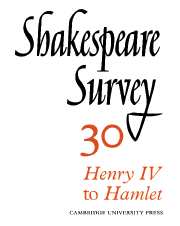Book contents
- Frontmatter
- ‘Henry IV’ and ‘Hamlet’
- Prince Hal and Tragic Style
- The True Prince and the False Thief: Prince Hal and the Shift of Identity
- Falstaff, the Prince, and the Pattern of ‘2 Henry IV’
- Whatever Happened to Prince Hal?: An Essay on ‘Henry V’
- ‘Henry V’ and the Bees’ Commonwealth
- ‘All’s Well that Ends Well’
- ‘Hamlet’ and the Power of Words
- Hamlet the Bonesetter
- ‘Hamlet’: A Time to Die
- Shakespeare, Lyly and Ovid: The Influence of ‘Gallathea’ on ‘A Midsummer Night’s Dream’
- Making a Scene: Language and Gesture in ‘Coriolanus’
- Freedom and Loss in ‘The Tempest’
- Inigo Jones at The Cockpit
- Theory and Practice: Stratford 1976
- The Year's Contributions to Shakespearian Study 1 Critical Studies
- 2 Shakespeare’s Life, Times, and Stage
- 3 Textual Studies
- Index
- Plate Section
2 - Shakespeare’s Life, Times, and Stage
Published online by Cambridge University Press: 28 March 2007
- Frontmatter
- ‘Henry IV’ and ‘Hamlet’
- Prince Hal and Tragic Style
- The True Prince and the False Thief: Prince Hal and the Shift of Identity
- Falstaff, the Prince, and the Pattern of ‘2 Henry IV’
- Whatever Happened to Prince Hal?: An Essay on ‘Henry V’
- ‘Henry V’ and the Bees’ Commonwealth
- ‘All’s Well that Ends Well’
- ‘Hamlet’ and the Power of Words
- Hamlet the Bonesetter
- ‘Hamlet’: A Time to Die
- Shakespeare, Lyly and Ovid: The Influence of ‘Gallathea’ on ‘A Midsummer Night’s Dream’
- Making a Scene: Language and Gesture in ‘Coriolanus’
- Freedom and Loss in ‘The Tempest’
- Inigo Jones at The Cockpit
- Theory and Practice: Stratford 1976
- The Year's Contributions to Shakespearian Study 1 Critical Studies
- 2 Shakespeare’s Life, Times, and Stage
- 3 Textual Studies
- Index
- Plate Section
Summary
This year there are fewer full-length books to review in this section than is normally the case, though of course articles continue to appear in large numbers. There is little to report on the biographical side. Parvin Kujoory deals with the development of Shakespearian biography from the seventeenth to the late eighteenth centuries, from casual anecdotes to the scholarly approach of Malone. His essay contains no fresh material, however, and adds nothing to Samuel Schoenbaum’s magisterial Shakespeare’s Lives (Oxford, 1970), which Kujoory, rather surprisingly, does not mention.
One way of placing an author in his 'times' is to ask what the relation is between the artistic culture of a given age and the state of its politics. Joel Hurstfield suggests that the greatest period of Elizabethan society was ending as Shakespeare came to maturity, and goes on to debate what is meant when we describe late Elizabethan and early Jacobean political life as corrupt. Administrators of the time expected a fee for their service which must not necessarily be considered a bribe. The deepest corruption came in the later Jacobean period, when the king's favourites failed to consider the national interest as well as their personal interest. Hurstfield's discussion, though not primarily a piece of literary criticism, should be read by all literary students who are interested in Shakespeare's political themes.
- Type
- Chapter
- Information
- Shakespeare Survey , pp. 191 - 203Publisher: Cambridge University PressPrint publication year: 1977
- 1
- Cited by

